(2015聚焦中考)2015中考英语复习精品课件:第4讲 七年级下Units+7-12(共40张PPT)
文档属性
| 名称 | (2015聚焦中考)2015中考英语复习精品课件:第4讲 七年级下Units+7-12(共40张PPT) | 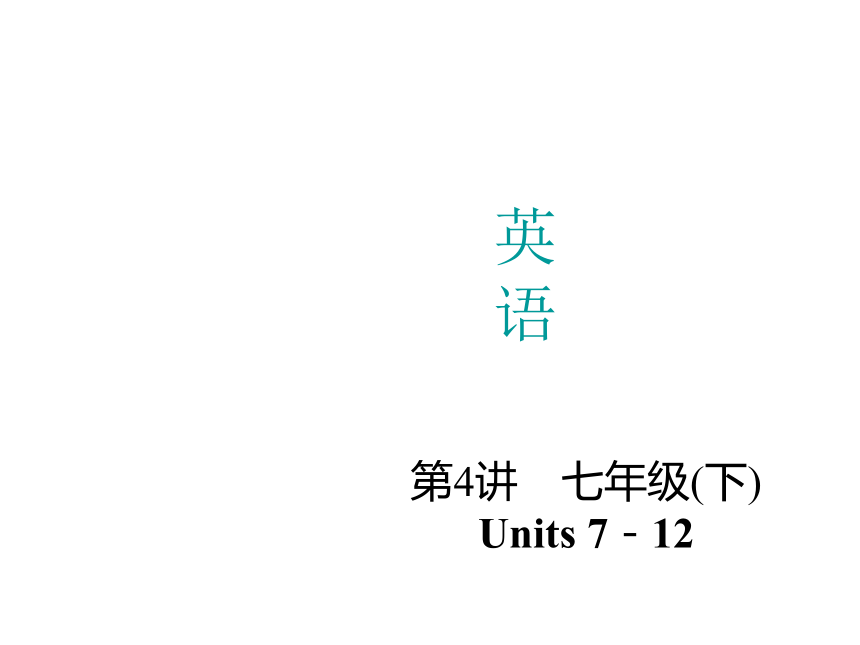 | |
| 格式 | zip | ||
| 文件大小 | 358.7KB | ||
| 资源类型 | 教案 | ||
| 版本资源 | 人教新目标(Go for it)版 | ||
| 科目 | 英语 | ||
| 更新时间 | 2014-12-19 21:31:57 | ||
图片预览

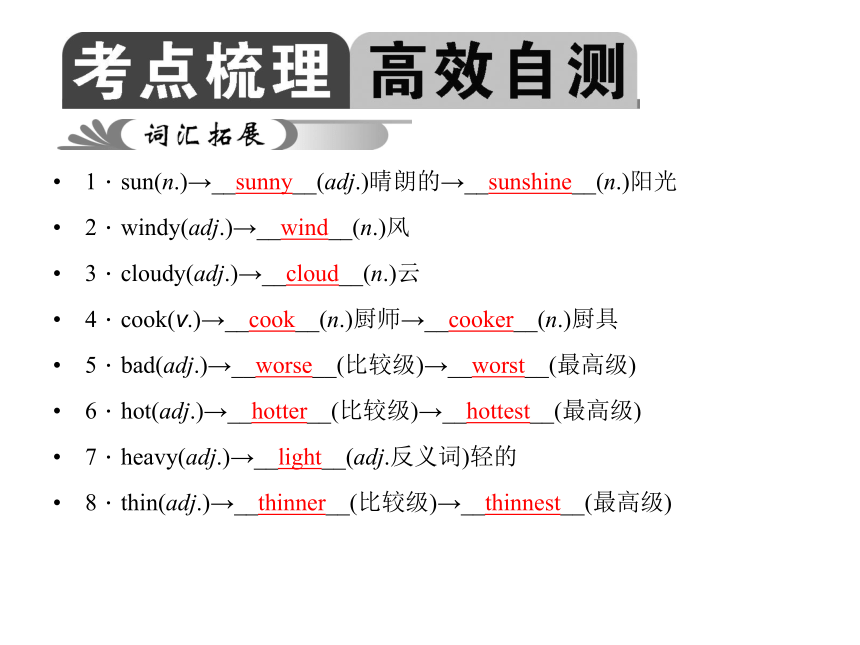


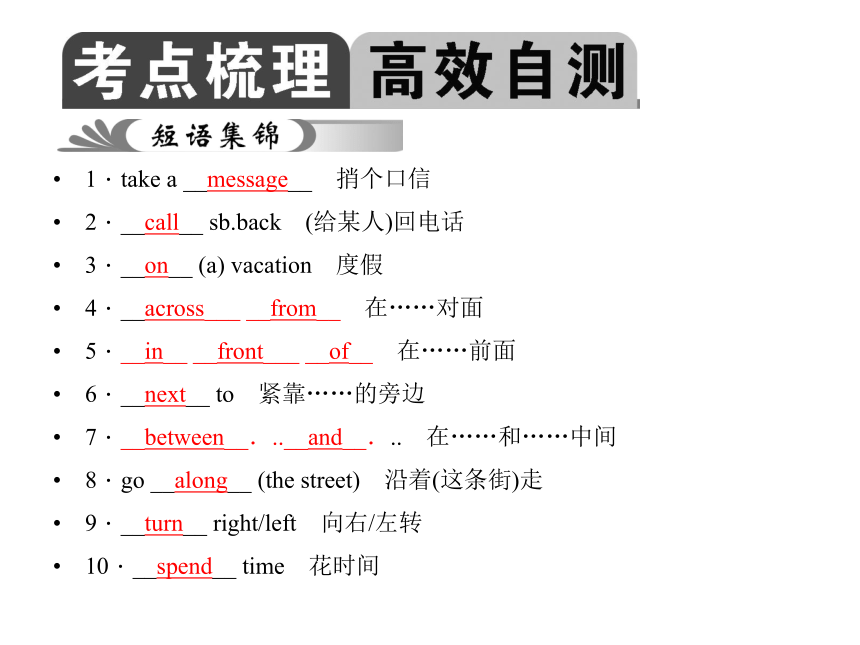
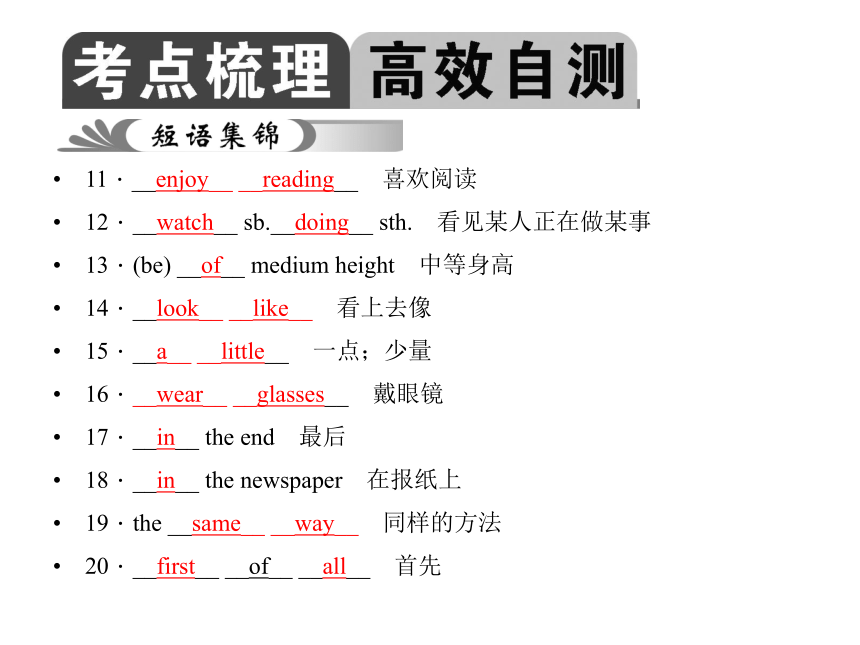

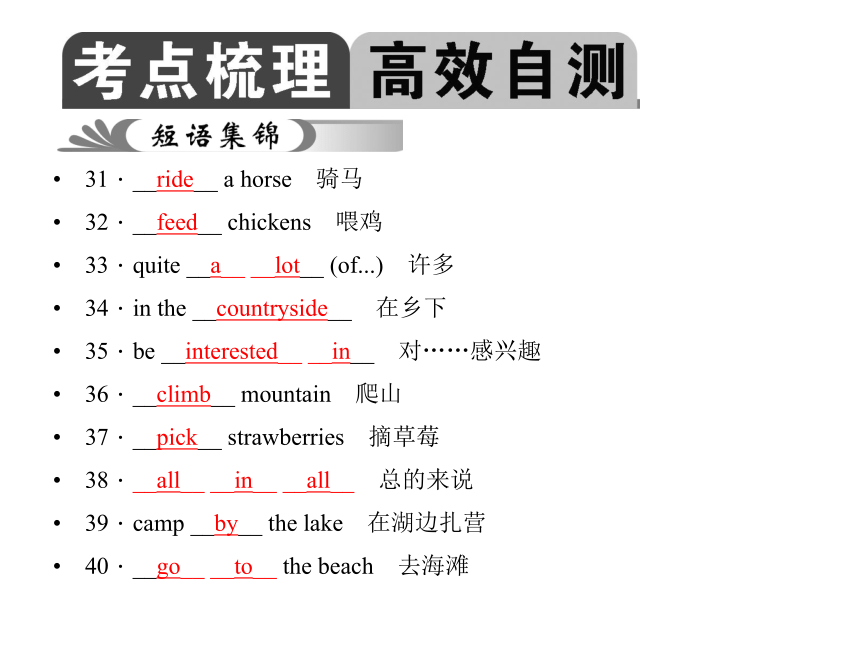
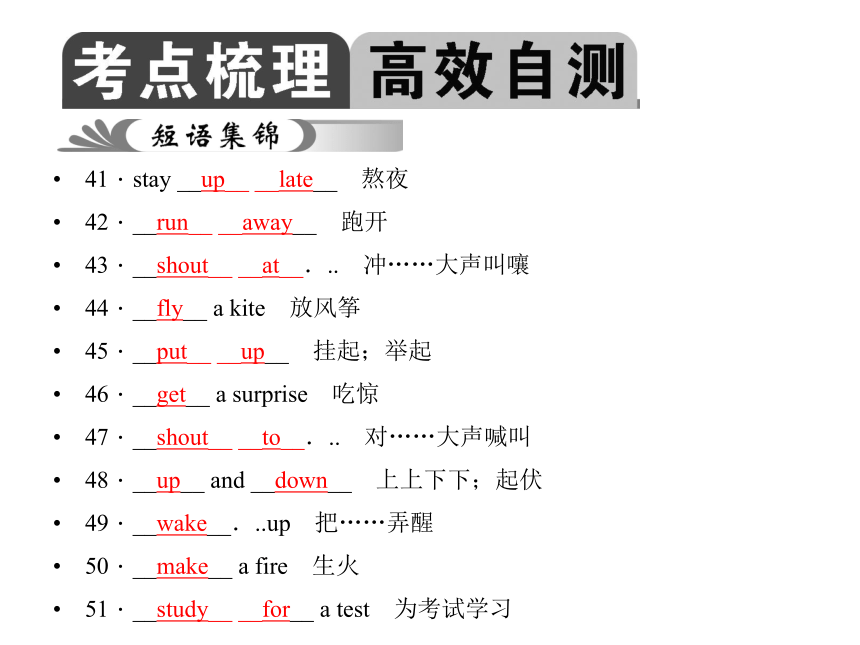
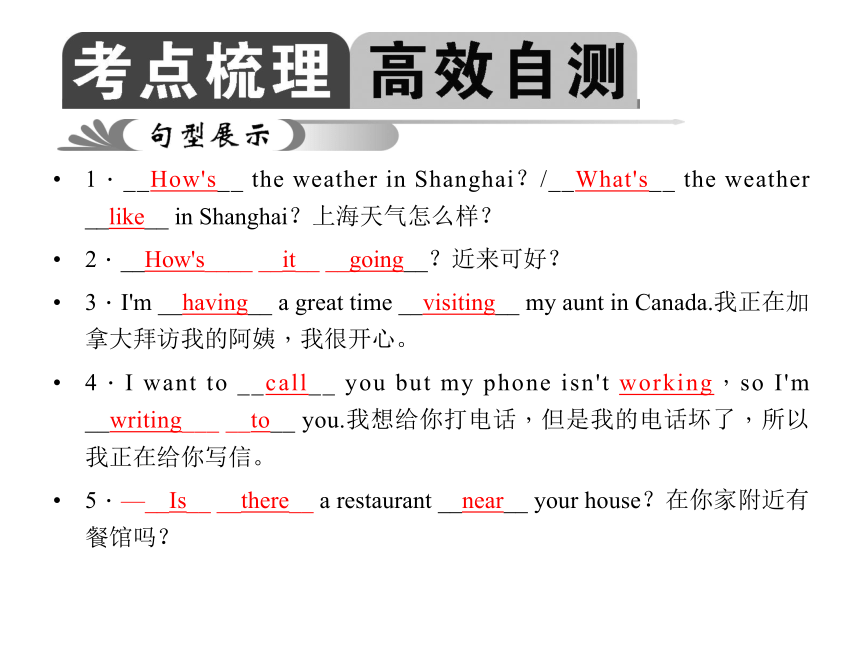
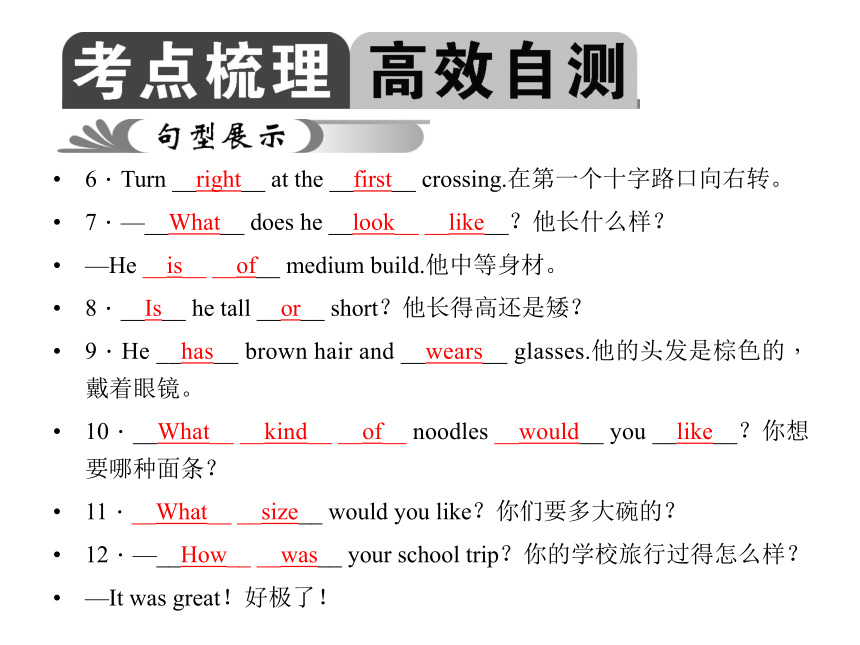
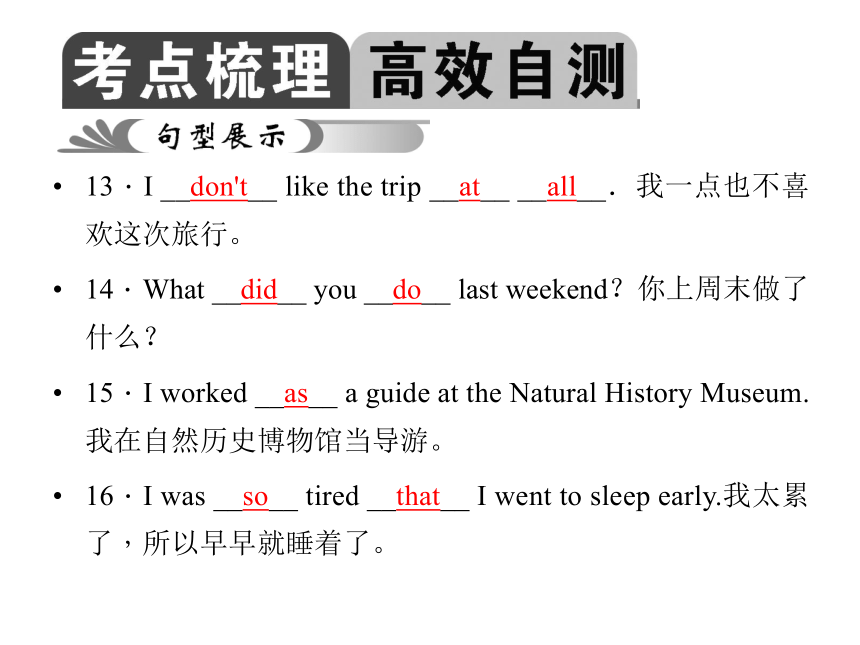
文档简介
课件40张PPT。英语第4讲 七年级(下)
Units 7-121.sun(n.)→__sunny__(adj.)晴朗的→__sunshine__(n.)阳光
2.windy(adj.)→__wind__(n.)风
3.cloudy(adj.)→__cloud__(n.)云
4.cook(v.)→__cook__(n.)厨师→__cooker__(n.)厨具
5.bad(adj.)→__worse__(比较级)→__worst__(最高级)
6.hot(adj.)→__hotter__(比较级)→__hottest__(最高级)
7.heavy(adj.)→__light__(adj.反义词)轻的
8.thin(adj.)→__thinner__(比较级)→__thinnest__(最高级)9.height(n.)→__high__(adj.)高的
10.put(v.)→__put__(过去式)→__put__(过去分词)
11.differently(adv.)→__different__(adj.)不同的→__difference__(n.)不同点
12.feed(v.)→__fed__(过去式)→__fed__(过去分词)
13.grow(v.)→__grew__(过去式)→__grown__(过去分词)
14.farm(n.)农场→__farmer__(n.)农民
15.worry(v.&n.)→__worried__(adj.)担忧的
16.exciting(adj.)→__excited__(adj.)感到兴奋的17.slow(adj.)→__slowly__(adv.)慢地→__fast__(adj.反义词)快的;迅速的
18.expensive(adj.)→__dear__(adj.同义词)贵的→__cheap__(adj.反义词)便宜的
19.mouse(n.)→__mice__(复数)
20.sheep(n.)→__sheep__(复数)
21.visitor(n.)→__visit__(v.)参观;访问
22.surprise(n.&v.)→__surprising__(adj.)令人吃惊的→__surprised__(adj.)感到惊讶的
23.nature(n.)→__natural__(adj.)自然的
24.wake(v.)→__awake__(adj.)醒着的→__sleep__(v.反义词)睡觉→__asleep__(adj.反义词)睡着的1.take a __message__ 捎个口信
2.__call__ sb.back (给某人)回电话
3.__on__ (a) vacation 度假
4.__across___ __from__ 在……对面
5.__in__ __front___ __of__ 在……前面
6.__next__ to 紧靠……的旁边
7.__between__...__and__... 在……和……中间
8.go __along__ (the street) 沿着(这条街)走
9.__turn__ right/left 向右/左转
10.__spend__ time 花时间11.__enjoy__ __reading__ 喜欢阅读
12.__watch__ sb.__doing__ sth. 看见某人正在做某事
13.(be) __of__ medium height 中等身高
14.__look__ __like__ 看上去像
15.__a__ __little__ 一点;少量
16.__wear__ __glasses__ 戴眼镜
17.__in__ the end 最后
18.__in__ the newspaper 在报纸上
19.the __same__ __way__ 同样的方法
20.__first__ __of__ __all__ 首先21.__would__ __like__ 愿意;想要
22.__take__ one's __order__ 点菜
23.one __bowl__ of...一碗……
24.__around__ the world 世界各地
25.__make__ a wish 许愿
26.blow __out__ 吹灭
27.__get__ popular 受欢迎;流行
28.__cut__ __up__ 切碎
29.__bring__ good __luck__ to... 给……带来好运
30.__milk__ a cow 给奶牛挤奶31.__ride__ a horse 骑马
32.__feed__ chickens 喂鸡
33.quite __a__ __lot__ (of...) 许多
34.in the __countryside__ 在乡下
35.be __interested__ __in__ 对……感兴趣
36.__climb__ mountain 爬山
37.__pick__ strawberries 摘草莓
38.__all__ __in__ __all__ 总的来说
39.camp __by__ the lake 在湖边扎营
40.__go__ __to__ the beach 去海滩41.stay __up__ __late__ 熬夜
42.__run__ __away__ 跑开
43.__shout__ __at__... 冲……大声叫嚷
44.__fly__ a kite 放风筝
45.__put__ __up__ 挂起;举起
46.__get__ a surprise 吃惊
47.__shout__ __to__... 对……大声喊叫
48.__up__ and __down__ 上上下下;起伏
49.__wake__...up 把……弄醒
50.__make__ a fire 生火
51.__study__ __for__ a test 为考试学习1.__How's__ the weather in Shanghai?/__What's__ the weather __like__ in Shanghai?上海天气怎么样?
2.__How's____ __it__ __going__?近来可好?
3.I'm __having__ a great time __visiting__ my aunt in Canada.我正在加拿大拜访我的阿姨,我很开心。
4.I want to __call__ you but my phone isn't working,so I'm __writing___ __to__ you.我想给你打电话,但是我的电话坏了,所以我正在给你写信。
5.—__Is__ __there__ a restaurant __near__ your house?在你家附近有餐馆吗?6.Turn __right__ at the __first__ crossing.在第一个十字路口向右转。
7.—__What__ does he __look__ __like__?他长什么样?
—He __is__ __of__ medium build.他中等身材。
8.__Is__ he tall __or__ short?他长得高还是矮?
9.He __has__ brown hair and __wears__ glasses.他的头发是棕色的,戴着眼镜。
10.__What__ __kind__ __of__ noodles __would__ you __like__?你想要哪种面条?
11.__What__ __size__ would you like?你们要多大碗的?
12.—__How__ __was__ your school trip?你的学校旅行过得怎么样?
—It was great!好极了!13.I __don't__ like the trip __at__ __all__.我一点也不喜欢这次旅行。
14.What __did__ you __do__ last weekend?你上周末做了什么?
15.I worked __as__ a guide at the Natural History Museum.我在自然历史博物馆当导游。
16.I was __so__ tired __that__ I went to sleep early.我太累了,所以早早就睡着了。 ?enjoy
【典例在线】
The children enjoy playing football.孩子们喜欢踢足球。
We enjoyed the film very much.我们非常喜欢那部电影。
They enjoyed themselves at the party last weekend.上周末他们在聚会上玩得很开心。【拓展精析】
enjoy作及物动词,意为“喜欢;享受……的乐趣”。
enjoy sth.喜欢某物;enjoy doing sth.喜欢干某事
enjoy oneself “玩得愉快”,相当于have a good time或have fun。
【活学活用】
1)The retired couple enjoy __D__ photos.(2013,上海)
A.take B.took C.to take D.taking?as
【典例在线】
We have a job for you as a waiter.我们有一个服务员的工作给你。
Liu Ying is not as good at sports as her sister.刘英不像她姐姐一样擅长运动。
My friend wears the same clothes as I do.我的朋友穿着跟我同样的衣服。
His mother looked after him as well as she could.他的妈妈尽她所能照顾好他。【拓展精析】
as作介词,意为“作为”。
as作连词,意为“同样;一样”,as...as意为“与……一样”,中间加形容词或副词的原级。not as/so...as意为“与……不一样”。
as作连词,意为“像……一样;由于”。
相关短语:as soon as一……就……;as usual像平常一样;regard...as把……看作;as...as possible=as...as sb.can尽可能……地;the same as与……一样;as a result 因此;as for至于;关于。【活学活用】
2)Now,people regard drinking tea __A__ a culture more than a habit.(2014,宣城模拟)
A.as B.by C.of D.with
3)—Where would you like to visit?
—I'd like to go __B__.(2014,芜湖模拟)
A.relaxing somewhere B.somewhere relaxing
C.relaxing anywhere D.anywhere relaxing
4)Everyone wants to win.But __A__ me,the most important thing is to learn something new and have fun.(2014,江西)
A.as for B.thanks to
C.instead of D.such as?—How is the weather in Beijing?北京的天气如何?
—It's sunny.晴朗。
【典例在线】
What's the weather like in Beijing?/How is the weather in Beijing?北京天气如何?
【拓展精析】
句型“How's the weather in+地点”常用来询问天气,回答用“It's...”。该句型等于“What's the weather like in+地点”。【活学活用】
1)—__D__
—It's sunny today.(2014,黄山模拟)
A.How was the weather yesterday?
B.How are you doing?
C.What fine weather!
D.What's the weather like today??Is there a hospital near here?这附近有医院吗?
【典例在线】
There is a book in my bag.我书包里有一本书。
there be结构,表示某处有/存在某人或某物。其中的be动词应根据主语的人称、数的不同而变化,主语是单数名词或第三人称单数时用is,主语是复数名词或其他人称时用are。
there be结构的一般疑问句是将be动词提到句首,句尾用问号。回答时先用Yes或No,再作简单回答。其否定形式是在be动词后加not。【拓展精析】
there be结构中be的后面若只有一个主语,谓语动词的数则取决于主语的数;若有几个主语并列,则通常与靠近的主语的数保持一致。
【活学活用】
2)There __D__ lots of sheep and pigs on my uncle's farm now.(2014,重庆)
A.was B.were C.is D.are
3)There __D__ be a fashion show in our town tomorrow.(2014,淮北模拟)
A.are going to B.will have
C.has D.is going to?What does your friend look like?你朋友长得怎么样?
【典例在线】
—What does your brother look like?你哥哥长什么样?
—He is tall and thin.他又高又瘦。
—What's your sister like?你妹妹是什么性格?
—She is outgoing.她很外向。【拓展精析】
该句型是用来询问人的外部特征的,回答常用高、矮、胖、瘦、大眼睛、高鼻子等来回答。即可用“主语+系动词+形容词”句式或者“主语+have/has+名词”句式,意思是“某人长着……”。
询问人的外部特征时也可用“What is/are sb.like?”句型。此句型还可用来询问人的性格。【活学活用】
4)—__A__?(2014,淮南模拟)
—He is not very heavy and wears glasses.
A.What does Ron look like
B.What is Ron
C.What do you think of Ron
D.How is Ron?across,cross,through,past,over
【典例在线】
They walked across the bridge.他们走过了那座桥。
Be careful when you cross the street.当你过马路时要小心。
The river runs through the city.这条河从城市中间流过。
She walked past a bank.她路过了一个银行。
The birds flew over the city.鸟儿飞过城市。【拓展精析】
across介词,意为“穿过”,指从物体表面穿过,有on的含义。cross动词,相当于go/walk/run across。
through介词,意为“从……通过;穿过”。指从物体内部穿过,有in的含义。
past介词,意为“经过;路过”,指从物体的旁边经过。
over介词,意为“穿过”,常指越过高的障碍物等。【拓展精析】
【活学活用】
1)The two men run __through__ the forest.
2)The little girl ran __across__ the road.
3)When I walked __past__ him,I found something strange on his face.
4)The cat jumped __over__ the wall and ran away.?cost,spend,take,pay
【典例在线】
The dictionary costs 30 yuan.这本词典花了三十元钱。
It took me two hours to do my homework last night.昨晚我做作业花了两个小时。
The journey took me two weeks.旅行花了我两周时间。
He spent five dollars on the book.他买书花了五美元。
He has paid 50 dollars for the medicine.他已付了50美元买药。【拓展精析】
①cost的主语只能是物或事,而不能是人,常用于sth.cost(s)(sb.)some money结构。
②take主要指花时间,常用结构为:It takes sb.some time to do sth.,it作形式主语,真正的主语是后面的不定式。
③spend的主语必须是人,常用于spend time/money on sth.或spend time/money (in) doing sth.结构中,其中in可省略。
④pay的主语是人,通常用于pay some money for sth.“为……而付款”结构。【活学活用】
5)Tom __paid__ for the meal just now.
6)How much do the shoes __cost__?
7)I __spent__ an hour on this math problem this morning.
8)It usually __takes__ me two hours to do my homework every day.?little,a little,few,a few
【典例在线】
There is little milk in the glass.杯子里几乎没牛奶了。
He can speak a little English.他会说一点儿英语。
She said that memorizing the words of pop also helped a little.她说记流行歌词也有点儿帮助。
Few eggs are left,we have to buy some.没多少鸡蛋剩下了,我们不得不买一些。
There are a few apples on the table,would you like one?桌上有一些苹果,你想要一个吗?【拓展精析】
little修饰不可数名词,意为“少量”(几乎没有),表否定意义。
a little修饰不可数名词,意为“一点儿”,表肯定意义。
little,a little还可修饰动词,放在动词之后。
few修饰可数名词,意为“少量”(几乎没有),表否定意义。
a few修饰可数名词,意为“一点儿”,表肯定意义。【活学活用】
9)In our school,________ students like English,but __B__ of them can speak English smoothly.(2014,铜仁)
A.a little;a few B.a few;few
C.a few;little D.a little;few
10)There is __D__ news about this movie star in the newspaper.Where can I get some?(2014,六安模拟)
A.many B.a few C.a little D.little?cheap,expensive,high,low
【典例在线】
This cloth doll is very cheap.这个布娃娃很便宜。
This watch is expensive.这块表很贵。
The price of this watch is too high.这块表的价格太高了。
The price of this book is not low for me.这本书的价格对我来说不低。【拓展精析】
expensive与high涉及价格“高”,而cheap与low涉及价格“低”。expensive,cheap是一组反义词,其主语必须是货物、物品本身,不能是价格。high,low是一组反义词,其主语是价格(price),不能是物品本身。
询问价格的句型为:How much is...?=What is the price of...?【活学活用】
11)The things in the supermarket are not __expensive.这家超市的东西不贵。
12)The price of this house is too __high__ for him to afford.对他来说这房子的价格太高,买不起。?anything,something,nothing,everything
【典例在线】
We can't believe anything he says.无论他说什么,我们都不能相信。
Something is wrong with your eyes.你的眼睛有问题。
Nothing is impossible.没有什么是不可能的。
I hope everything goes well.我希望一切顺利。
Is there anything important in today's newspaper?今天报纸上有什么重要事情吗?【拓展精析】
anything意为“任何事;某事”,常用于否定句或疑问句中。
something意为“某事;某物”,常用于肯定句中,也可用于征求意见的疑问句中。
nothing意为“没有什么;没有东西”。
everything意为“每件事;一切事情”,可用于肯定句、疑问句或否定句中。
注意:复合不定代词作主语,谓语动词用第三人称单数形式;形容词修饰复合不定代词应后置。【活学活用】
13)Look!Sonia looks worried.There must be __B__ wrong with her.(2014,济宁)
A.nothing B.Something C.anything D.everything
14)This work needs close teamwork.__A__ will be achieved unless we work well together.(2014,苏州)
A.Nothing B.Anything C.Something D.Everything
15)—Would you like __A__ to eat?
—No,thanks.(2014,宿州模拟)
A.something B.Anything C.nothing D.everything请完成考点跟踪突破4
Units 7-121.sun(n.)→__sunny__(adj.)晴朗的→__sunshine__(n.)阳光
2.windy(adj.)→__wind__(n.)风
3.cloudy(adj.)→__cloud__(n.)云
4.cook(v.)→__cook__(n.)厨师→__cooker__(n.)厨具
5.bad(adj.)→__worse__(比较级)→__worst__(最高级)
6.hot(adj.)→__hotter__(比较级)→__hottest__(最高级)
7.heavy(adj.)→__light__(adj.反义词)轻的
8.thin(adj.)→__thinner__(比较级)→__thinnest__(最高级)9.height(n.)→__high__(adj.)高的
10.put(v.)→__put__(过去式)→__put__(过去分词)
11.differently(adv.)→__different__(adj.)不同的→__difference__(n.)不同点
12.feed(v.)→__fed__(过去式)→__fed__(过去分词)
13.grow(v.)→__grew__(过去式)→__grown__(过去分词)
14.farm(n.)农场→__farmer__(n.)农民
15.worry(v.&n.)→__worried__(adj.)担忧的
16.exciting(adj.)→__excited__(adj.)感到兴奋的17.slow(adj.)→__slowly__(adv.)慢地→__fast__(adj.反义词)快的;迅速的
18.expensive(adj.)→__dear__(adj.同义词)贵的→__cheap__(adj.反义词)便宜的
19.mouse(n.)→__mice__(复数)
20.sheep(n.)→__sheep__(复数)
21.visitor(n.)→__visit__(v.)参观;访问
22.surprise(n.&v.)→__surprising__(adj.)令人吃惊的→__surprised__(adj.)感到惊讶的
23.nature(n.)→__natural__(adj.)自然的
24.wake(v.)→__awake__(adj.)醒着的→__sleep__(v.反义词)睡觉→__asleep__(adj.反义词)睡着的1.take a __message__ 捎个口信
2.__call__ sb.back (给某人)回电话
3.__on__ (a) vacation 度假
4.__across___ __from__ 在……对面
5.__in__ __front___ __of__ 在……前面
6.__next__ to 紧靠……的旁边
7.__between__...__and__... 在……和……中间
8.go __along__ (the street) 沿着(这条街)走
9.__turn__ right/left 向右/左转
10.__spend__ time 花时间11.__enjoy__ __reading__ 喜欢阅读
12.__watch__ sb.__doing__ sth. 看见某人正在做某事
13.(be) __of__ medium height 中等身高
14.__look__ __like__ 看上去像
15.__a__ __little__ 一点;少量
16.__wear__ __glasses__ 戴眼镜
17.__in__ the end 最后
18.__in__ the newspaper 在报纸上
19.the __same__ __way__ 同样的方法
20.__first__ __of__ __all__ 首先21.__would__ __like__ 愿意;想要
22.__take__ one's __order__ 点菜
23.one __bowl__ of...一碗……
24.__around__ the world 世界各地
25.__make__ a wish 许愿
26.blow __out__ 吹灭
27.__get__ popular 受欢迎;流行
28.__cut__ __up__ 切碎
29.__bring__ good __luck__ to... 给……带来好运
30.__milk__ a cow 给奶牛挤奶31.__ride__ a horse 骑马
32.__feed__ chickens 喂鸡
33.quite __a__ __lot__ (of...) 许多
34.in the __countryside__ 在乡下
35.be __interested__ __in__ 对……感兴趣
36.__climb__ mountain 爬山
37.__pick__ strawberries 摘草莓
38.__all__ __in__ __all__ 总的来说
39.camp __by__ the lake 在湖边扎营
40.__go__ __to__ the beach 去海滩41.stay __up__ __late__ 熬夜
42.__run__ __away__ 跑开
43.__shout__ __at__... 冲……大声叫嚷
44.__fly__ a kite 放风筝
45.__put__ __up__ 挂起;举起
46.__get__ a surprise 吃惊
47.__shout__ __to__... 对……大声喊叫
48.__up__ and __down__ 上上下下;起伏
49.__wake__...up 把……弄醒
50.__make__ a fire 生火
51.__study__ __for__ a test 为考试学习1.__How's__ the weather in Shanghai?/__What's__ the weather __like__ in Shanghai?上海天气怎么样?
2.__How's____ __it__ __going__?近来可好?
3.I'm __having__ a great time __visiting__ my aunt in Canada.我正在加拿大拜访我的阿姨,我很开心。
4.I want to __call__ you but my phone isn't working,so I'm __writing___ __to__ you.我想给你打电话,但是我的电话坏了,所以我正在给你写信。
5.—__Is__ __there__ a restaurant __near__ your house?在你家附近有餐馆吗?6.Turn __right__ at the __first__ crossing.在第一个十字路口向右转。
7.—__What__ does he __look__ __like__?他长什么样?
—He __is__ __of__ medium build.他中等身材。
8.__Is__ he tall __or__ short?他长得高还是矮?
9.He __has__ brown hair and __wears__ glasses.他的头发是棕色的,戴着眼镜。
10.__What__ __kind__ __of__ noodles __would__ you __like__?你想要哪种面条?
11.__What__ __size__ would you like?你们要多大碗的?
12.—__How__ __was__ your school trip?你的学校旅行过得怎么样?
—It was great!好极了!13.I __don't__ like the trip __at__ __all__.我一点也不喜欢这次旅行。
14.What __did__ you __do__ last weekend?你上周末做了什么?
15.I worked __as__ a guide at the Natural History Museum.我在自然历史博物馆当导游。
16.I was __so__ tired __that__ I went to sleep early.我太累了,所以早早就睡着了。 ?enjoy
【典例在线】
The children enjoy playing football.孩子们喜欢踢足球。
We enjoyed the film very much.我们非常喜欢那部电影。
They enjoyed themselves at the party last weekend.上周末他们在聚会上玩得很开心。【拓展精析】
enjoy作及物动词,意为“喜欢;享受……的乐趣”。
enjoy sth.喜欢某物;enjoy doing sth.喜欢干某事
enjoy oneself “玩得愉快”,相当于have a good time或have fun。
【活学活用】
1)The retired couple enjoy __D__ photos.(2013,上海)
A.take B.took C.to take D.taking?as
【典例在线】
We have a job for you as a waiter.我们有一个服务员的工作给你。
Liu Ying is not as good at sports as her sister.刘英不像她姐姐一样擅长运动。
My friend wears the same clothes as I do.我的朋友穿着跟我同样的衣服。
His mother looked after him as well as she could.他的妈妈尽她所能照顾好他。【拓展精析】
as作介词,意为“作为”。
as作连词,意为“同样;一样”,as...as意为“与……一样”,中间加形容词或副词的原级。not as/so...as意为“与……不一样”。
as作连词,意为“像……一样;由于”。
相关短语:as soon as一……就……;as usual像平常一样;regard...as把……看作;as...as possible=as...as sb.can尽可能……地;the same as与……一样;as a result 因此;as for至于;关于。【活学活用】
2)Now,people regard drinking tea __A__ a culture more than a habit.(2014,宣城模拟)
A.as B.by C.of D.with
3)—Where would you like to visit?
—I'd like to go __B__.(2014,芜湖模拟)
A.relaxing somewhere B.somewhere relaxing
C.relaxing anywhere D.anywhere relaxing
4)Everyone wants to win.But __A__ me,the most important thing is to learn something new and have fun.(2014,江西)
A.as for B.thanks to
C.instead of D.such as?—How is the weather in Beijing?北京的天气如何?
—It's sunny.晴朗。
【典例在线】
What's the weather like in Beijing?/How is the weather in Beijing?北京天气如何?
【拓展精析】
句型“How's the weather in+地点”常用来询问天气,回答用“It's...”。该句型等于“What's the weather like in+地点”。【活学活用】
1)—__D__
—It's sunny today.(2014,黄山模拟)
A.How was the weather yesterday?
B.How are you doing?
C.What fine weather!
D.What's the weather like today??Is there a hospital near here?这附近有医院吗?
【典例在线】
There is a book in my bag.我书包里有一本书。
there be结构,表示某处有/存在某人或某物。其中的be动词应根据主语的人称、数的不同而变化,主语是单数名词或第三人称单数时用is,主语是复数名词或其他人称时用are。
there be结构的一般疑问句是将be动词提到句首,句尾用问号。回答时先用Yes或No,再作简单回答。其否定形式是在be动词后加not。【拓展精析】
there be结构中be的后面若只有一个主语,谓语动词的数则取决于主语的数;若有几个主语并列,则通常与靠近的主语的数保持一致。
【活学活用】
2)There __D__ lots of sheep and pigs on my uncle's farm now.(2014,重庆)
A.was B.were C.is D.are
3)There __D__ be a fashion show in our town tomorrow.(2014,淮北模拟)
A.are going to B.will have
C.has D.is going to?What does your friend look like?你朋友长得怎么样?
【典例在线】
—What does your brother look like?你哥哥长什么样?
—He is tall and thin.他又高又瘦。
—What's your sister like?你妹妹是什么性格?
—She is outgoing.她很外向。【拓展精析】
该句型是用来询问人的外部特征的,回答常用高、矮、胖、瘦、大眼睛、高鼻子等来回答。即可用“主语+系动词+形容词”句式或者“主语+have/has+名词”句式,意思是“某人长着……”。
询问人的外部特征时也可用“What is/are sb.like?”句型。此句型还可用来询问人的性格。【活学活用】
4)—__A__?(2014,淮南模拟)
—He is not very heavy and wears glasses.
A.What does Ron look like
B.What is Ron
C.What do you think of Ron
D.How is Ron?across,cross,through,past,over
【典例在线】
They walked across the bridge.他们走过了那座桥。
Be careful when you cross the street.当你过马路时要小心。
The river runs through the city.这条河从城市中间流过。
She walked past a bank.她路过了一个银行。
The birds flew over the city.鸟儿飞过城市。【拓展精析】
across介词,意为“穿过”,指从物体表面穿过,有on的含义。cross动词,相当于go/walk/run across。
through介词,意为“从……通过;穿过”。指从物体内部穿过,有in的含义。
past介词,意为“经过;路过”,指从物体的旁边经过。
over介词,意为“穿过”,常指越过高的障碍物等。【拓展精析】
【活学活用】
1)The two men run __through__ the forest.
2)The little girl ran __across__ the road.
3)When I walked __past__ him,I found something strange on his face.
4)The cat jumped __over__ the wall and ran away.?cost,spend,take,pay
【典例在线】
The dictionary costs 30 yuan.这本词典花了三十元钱。
It took me two hours to do my homework last night.昨晚我做作业花了两个小时。
The journey took me two weeks.旅行花了我两周时间。
He spent five dollars on the book.他买书花了五美元。
He has paid 50 dollars for the medicine.他已付了50美元买药。【拓展精析】
①cost的主语只能是物或事,而不能是人,常用于sth.cost(s)(sb.)some money结构。
②take主要指花时间,常用结构为:It takes sb.some time to do sth.,it作形式主语,真正的主语是后面的不定式。
③spend的主语必须是人,常用于spend time/money on sth.或spend time/money (in) doing sth.结构中,其中in可省略。
④pay的主语是人,通常用于pay some money for sth.“为……而付款”结构。【活学活用】
5)Tom __paid__ for the meal just now.
6)How much do the shoes __cost__?
7)I __spent__ an hour on this math problem this morning.
8)It usually __takes__ me two hours to do my homework every day.?little,a little,few,a few
【典例在线】
There is little milk in the glass.杯子里几乎没牛奶了。
He can speak a little English.他会说一点儿英语。
She said that memorizing the words of pop also helped a little.她说记流行歌词也有点儿帮助。
Few eggs are left,we have to buy some.没多少鸡蛋剩下了,我们不得不买一些。
There are a few apples on the table,would you like one?桌上有一些苹果,你想要一个吗?【拓展精析】
little修饰不可数名词,意为“少量”(几乎没有),表否定意义。
a little修饰不可数名词,意为“一点儿”,表肯定意义。
little,a little还可修饰动词,放在动词之后。
few修饰可数名词,意为“少量”(几乎没有),表否定意义。
a few修饰可数名词,意为“一点儿”,表肯定意义。【活学活用】
9)In our school,________ students like English,but __B__ of them can speak English smoothly.(2014,铜仁)
A.a little;a few B.a few;few
C.a few;little D.a little;few
10)There is __D__ news about this movie star in the newspaper.Where can I get some?(2014,六安模拟)
A.many B.a few C.a little D.little?cheap,expensive,high,low
【典例在线】
This cloth doll is very cheap.这个布娃娃很便宜。
This watch is expensive.这块表很贵。
The price of this watch is too high.这块表的价格太高了。
The price of this book is not low for me.这本书的价格对我来说不低。【拓展精析】
expensive与high涉及价格“高”,而cheap与low涉及价格“低”。expensive,cheap是一组反义词,其主语必须是货物、物品本身,不能是价格。high,low是一组反义词,其主语是价格(price),不能是物品本身。
询问价格的句型为:How much is...?=What is the price of...?【活学活用】
11)The things in the supermarket are not __expensive.这家超市的东西不贵。
12)The price of this house is too __high__ for him to afford.对他来说这房子的价格太高,买不起。?anything,something,nothing,everything
【典例在线】
We can't believe anything he says.无论他说什么,我们都不能相信。
Something is wrong with your eyes.你的眼睛有问题。
Nothing is impossible.没有什么是不可能的。
I hope everything goes well.我希望一切顺利。
Is there anything important in today's newspaper?今天报纸上有什么重要事情吗?【拓展精析】
anything意为“任何事;某事”,常用于否定句或疑问句中。
something意为“某事;某物”,常用于肯定句中,也可用于征求意见的疑问句中。
nothing意为“没有什么;没有东西”。
everything意为“每件事;一切事情”,可用于肯定句、疑问句或否定句中。
注意:复合不定代词作主语,谓语动词用第三人称单数形式;形容词修饰复合不定代词应后置。【活学活用】
13)Look!Sonia looks worried.There must be __B__ wrong with her.(2014,济宁)
A.nothing B.Something C.anything D.everything
14)This work needs close teamwork.__A__ will be achieved unless we work well together.(2014,苏州)
A.Nothing B.Anything C.Something D.Everything
15)—Would you like __A__ to eat?
—No,thanks.(2014,宿州模拟)
A.something B.Anything C.nothing D.everything请完成考点跟踪突破4
